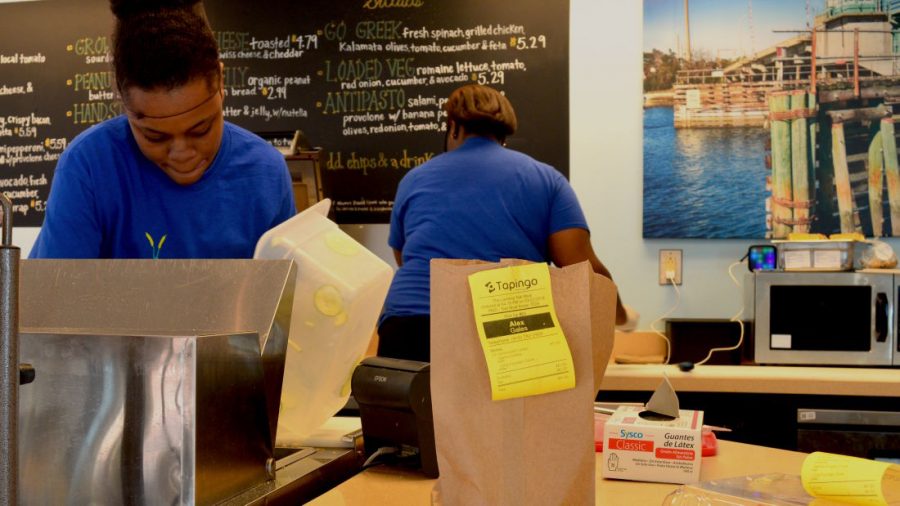Tapingo cuts food lines for students, has minimal impact on food workers
Tron Daniels, an employee at UNCW on-campus sandwich shop Landwich, refills cucumbers in the food preparation area to keep up with the growing number of lunchtime clientele brought by new food ordering app Tapingo.
Lines for food at UNCW are shorter for users of Tapingo, the mobile food ordering app that is boosting business for on-campus dining and creating delivery jobs for students.
“It’s awesome,” said senior and transfer student Charles Puher, who has used the app in the morning for the past two weeks to avoid the usual line at Einstein Bros. Bagels.
He puts in his order before he leaves his apartment in the morning. By the time Puher gets to school, his food is ready and waiting for him in the Tapingo pick-up area.
“It just seemed like the next step in making this [food service] an easier process,” said UNCW student and Campus Dining marketing intern Evan Langston.
UNCW modeled its Tapingo infrastructure after the University of North Carolina at Chapel Hill and North Carolina State University, which began using the platform in the later months of 2015, according to Langston.
Tapingo has brought more daily customers to campus dining while not making food workers’ jobs more difficult, according to junior and Dunkin’ Donuts employee Matthew Rodriguez.
“It makes me think more, but it doesn’t actually change the way I work,” said Rodriguez.
Dunkin’ Donuts sees an estimated 30 Tapingo orders per morning, and employees give those orders priority in order to be ready for customers who walk in and order.
But Tapingo is adding a new dimension to campus dining: the option for delivery, which is creating on-campus jobs in similar fashion to Uber.
“It’s the convenience factor that I like about it,” said Elise Trogden, who works part time as a desk receptionist on campus.
Trogden has used the app to have both Cookout and Chipotle delivered to her desk, both times for a fee of around three dollars. Her friends and roommates use it, too, according to Trogden, and it seems to be gaining popularity.
Indeed, the San Francisco and Tel Aviv, Israel-based mobile commerce application has expanded its services to more than 100 college campuses since its launch in spring 2012. It has received $36 million in venture capital, according to techcrunch.com, a majority of which came from Californian venture capital firms Qualcomm Ventures ($22 million) and Khosla Ventures ($10.5 million).
Off-campus restaurants like Taco Bell and Chipotle are available for delivery on the application, and Langston said she expects more to come soon.
Still, there are kinks in the system that are being worked out. For example, campus restaurants have no control over what is available on the Tapingo menu, and there is no way to tell mobile customers which items have run out, according to Rodriguez.
On-campus sandwich shop Landwich has become “hectic” between the hours of 10:30 am and 12 pm, said Tron Daniels, who has worked there for six months.
The restaurant needs to add an extra employee just to focus on arranging the Tapingo orders because of the high volume, according to Daniels.
“I don’t necessarily think it’s a pain,” said China Doughty, an employee at Opa! in Hawk’s Nest who is attending real estate school. “I think it’s a good idea that has its pros and cons.”
It doesn’t slow Doughty down, and she is still able to give Tapingo orders priority over walk-ins.
Students would pay Tapingo up to one dollar to avoid lines, according to student Elise Trogden.
“It wouldn’t stop me from using it,” said Elise. The service is valuable enough that it wouldn’t bother her if the company rolled out that charge tomorrow.
But that’s not going to happen any time soon, according to Langston.
“We have a contract with them,” said Langston. “They would have to go through us.”
Campus Dining has worked hard to get Teal Meals and Food Dollars integrated into the app, and it seems to be paying dividends for both food retailers and students.
“It makes everything quicker, and I guess that’s the goal,” said sophomore Phillip Morie. His roommates love Tapingo, and he is planning to begin using it soon as well.








